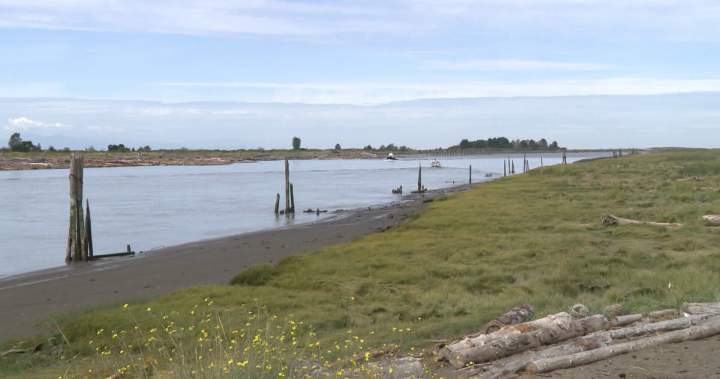The B.C. Supreme Court has delivered a precedent-setting ruling on a land claim brought forward by four First Nations after a multi-year court battle.
The piece of land in question is a 750-hectare parcel in Richmond, including city and port lands, farms, golf courses and commercial properties.
The Quw’utsun Nation, Cowichan Tribes, along with the Stz’uminus First Nation, Penelakut Tribe, Halalt First Nation and all other descendants of the Cowichan Nation, launched legal action in 2019 to recover their government-held lands near the mouth of the Fraser River – known as the traditional village of Tl’uqtinus.
They also sought a declaration of an Aboriginal right to fish the south arm of the Fraser River for food.
Today, land in the claim area is owned by the federal Crown, the B.C. government, the Vancouver Fraser Port Authority, the City of Richmond and private third parties.
The defendants in the case were not only the federal government, the B.C. government and the port authority but also the Tsawwassen First Nation and the Musqueam Indian Band.
“This is the first case that we’ve really seen First Nations pitted against each other, in an Aboriginal title trial,” Aaron Wilson, a member of the Musqueam Nation and an associate at Mandel Pinder LLP, which represented the nation.
“We’re talking about years of work, millions of dollars in legal fees.”
When the Europeans made contact in the early 1790s, the Cowichan (Quw’utsun mustimuhw) were an Indigenous people, established of 11 local groups.
Get breaking National news
For news impacting Canada and around the world, sign up for breaking news alerts delivered directly to you when they happen.
Every summer, the Cowichan travelled to their Lands of Tl’uqtinus, in what is now modern-day Richmond, to fish and harvest resources.
Hudson’s Bay Company officials first sighted the village in 1824, however, the Cowichan Nation states that during colonial reserve creation, beginning 1859, Col. Richard Moody, the Chief Commissioner of Lands for the Colony of British Columbia, did not finalize the village and surrounding lands as a Cowichan Indian reserve and took part of the land for himself.
The Cowichan Nation said it was not seeking to recover any privately-held lands in the court case but they wanted lands held by government returned to them.
The ruling by Justice Barbara Young directs the Crown to decide how to settle ownership where current legal titles overlap with Cowichan’s newly-recognized title.
“Really, it’s the province and federal governments that will have to deal with this,” lawyer Peter Grant said.
“Federal Crown may have to transfer some of the land back, they may have to compensate them for the financial benefits that they’ve got from those lands.”
In a statement, B.C.’s Attorney General Niki Sharma said the province is reviewing the court ruling to determine any next steps as it “considers an appeal.”
B.C. Premier David Eby said in a statement, “Let me be clear: owning private property with clear title is key to borrowing for a mortgage, economic certainty, and the real estate market.
“We remain committed to protecting and upholding this foundation of business and personal predictability, and our provincial economy, for Indigenous and non-Indigenous people alike.”
Chief Wayne Sparrow of the Musqueam First Nation said they were disappointed by the outcome of the case.
Young’s ruling means that Quw’utsun’s right to fish that area of the Fraser River for food can be done without needing permission from the Musqueam Indian Band.
“It surprised us a little bit because, you know, you’re always in the hands of a judge and you don’t know how a judge is going to act,” Sparrow said.
He added that they will have their legal team review the case and determine next steps.
“We’re going to continue to fight and stick up for our rights for our area that our ancestors have left in our control and we’ll defend it to the maximum.”
Sparrow said it would be disappointing for First Nations’ oral history to be overwritten by colonial judges and systems put in place that they have been fighting against for generations.
He said this also affects nation-to-nation relationships.
“There’s family names that are shared, there’s deep connections and kinship that we’ve always had and that’s what we talked about in the court case,” Sparrow explained.
“Pre-contact, we had a government that was governed through our Indian laws and that’s one of the sole arguments that we have. We have very close relationships to those communities, we share our names, we share a lot of that history and that’s what it’s boiled down to — yeah, it’s going to have a lot of hard feelings with our communities.”
Wilson said the next step will be to review the 863-page judgment, following a trial that lasted five years and a deliberation period of 20 months, making it the longest trial in Canadian history.
“It’s incredibly complex and we will continue to review the decision and advise Musqueam,” he said.
“Musqueam are considering all options.”
© 2025 Global News, a division of Corus Entertainment Inc.
Canada’s longest trial ends in precedent-setting B.C. land claim ruling for 4 First Nations


